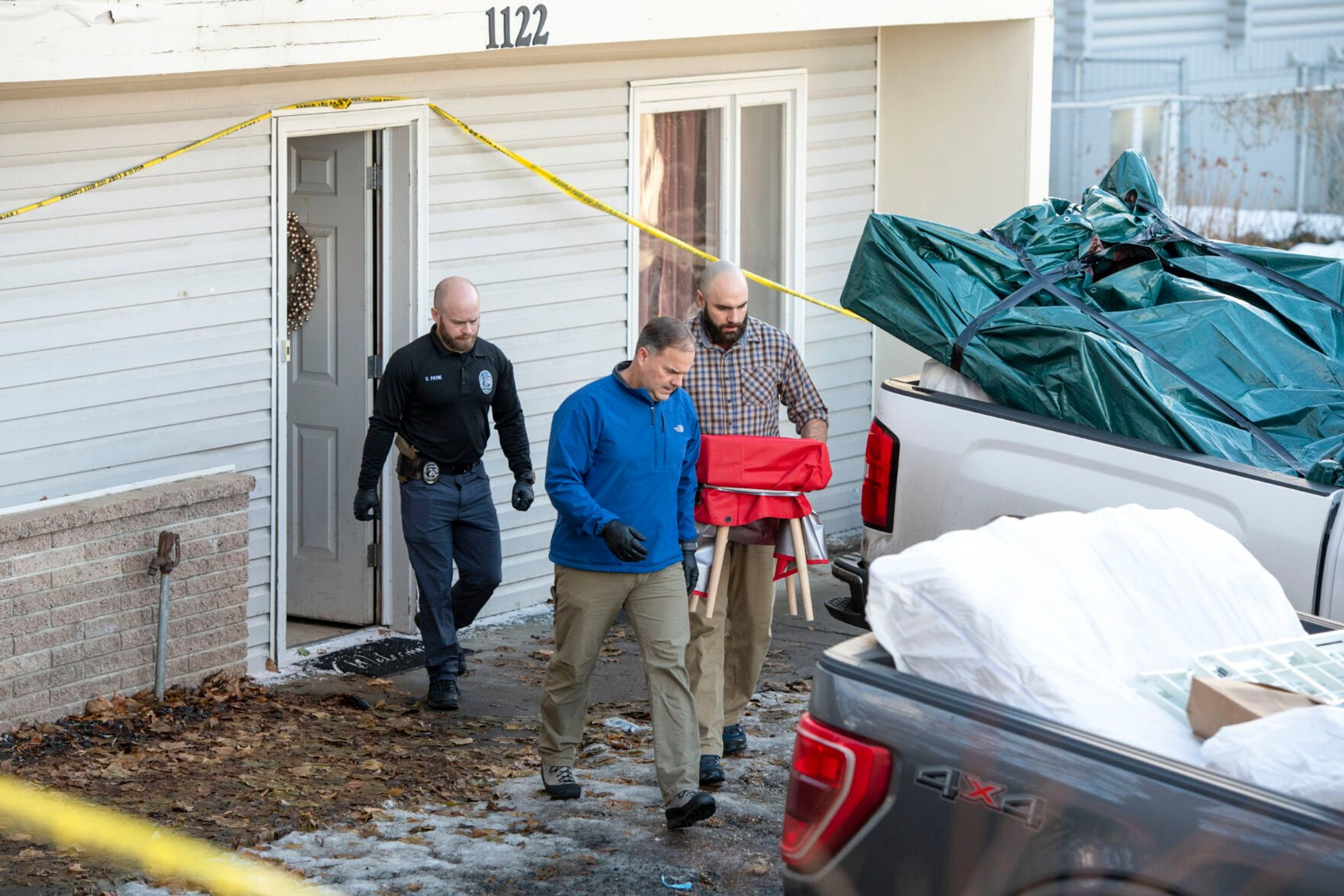Moscow murders: What we know now
More information about suspect, case has been revealed in recent weeks, but questions remain
Nearly four months since four University of Idaho students were killed in a Moscow home, information surrounding the case continues to trickle out to the public.
Bryan Kohberger, 28, faces four counts of first-degree murder and one count of burglary in the November stabbing deaths of University of Idaho students Kaylee Goncalves, Madison Mogen, Xana Kernodle and Ethan Chapin. Kohberger remains in Latah County Jail as he awaits his June 26 preliminary hearing.
While court officials and law enforcement remain quiet about the case because of a court-imposed nondissemination order, or gag order, new developments about the suspect and the case are being revealed.
The search warrants
This past week, recently unsealed documents describe what items police seized following the Dec. 30 arrest of Kohberger at his family’s home in Chestnuthill Township, Pa.
Most notably, authorities recovered three knives, including one described as a Smith & Wesson pocket knife and another listed as a Taylor cutlery knife with a leather sheath. The other knife did not have a description.
The four victims were found stabbed to death, but it is unclear if any of these recovered knives may have been the murder weapon. While investigating the crime scene at the King Road home in Moscow on Nov. 13, police found a knife sheath that had “Ka-Bar,” “USMC,” and the United States Marine Corps eagle globe and anchor insignia stamped on its outside.
The Idaho State Lab later found a single source of male DNA on the button snap of the knife sheath. Police believe this is Kohberger’s DNA after comparing it to DNA evidence police obtained from the trash at Kohberger’s parents’ house two days before he was arrested.
Pennsylvania authorities also recovered multiple dark clothing items, including black masks. According to a probable cause affidavit detailing the events leading to Kohberger’s arrest, a surviving roommate living at the King Road home told Moscow police that she saw a “figure clad in black clothing and a mask that covered the person’s mouth and nose walking towards her” during the early morning hours when the four victims were killed.
Other items found during the search in Monroe County include a cellphone, a laptop and a 40-caliber “Glock 22 Gen 5” along with empty 40-caliber magazines. Police have never indicated that a gun was used during the homicides.
In January, Whitman County unsealed the document listing the items police seized at Kohberger’s Pullman home. That evidence includes one nitrile-type black glove; multiple hair strands, including one possibly from an animal; receipts from Walmart and Marshalls; a dust container from a vacuum; a computer tower; a “dark red spot;” two cuttings from an uncased pillow showing a reddish-brown stain; and two mattress covers with multiple stains.
Kohberger’s white Hyundai Elantra was also seized at his parents’ home. According to the probable cause affidavit, police used video footage of white Hyundai Elantra and Kohberger’s cellphone data to track his alleged movements before and after the Nov. 13 murders.
Kohberger and WSU
Media reports revealed that Kohberger, a former Washington State University Ph.D. student, was investigated by the university and fired from his teaching assistant job around the time of the murders.
According to a Feb. 10 New York Times article, faculty members held meetings with Kohberger before and after the murders regarding his behavior while he studied in the Department of Criminal Justice and Criminology.
The New York Times reported that some female students told professors Kohberger made them feel uncomfortable, including one instance where he was accused of following a female to her car.
While the university’s investigation did not find any wrongdoing in this matter, Kohberger was penalized for alleged altercations with a faculty member.
He allegedly had two altercations with a WSU professor he was assisting in September and in early December. For these incidents, Kohberger was fired from his teaching assistant role on Dec. 19 before his arrest. He is no longer enrolled at WSU.
The New York Times previously reported that students had complained about Kohberger’s harsh grading, resulting in a classroom discussion where he tried to defend the feedback he provided students.
The probable cause affidavit revealed that Kohberger applied for an internship with the Pullman Police Department last fall because he had an interest in assisting rural law enforcement with collecting and analyzing technological data in public safety operations. He also posted a Reddit survey asking participants to provide information to “understand how emotions and psychological traits influence decision making when committing a crime.”
While more information about Kohberger has been gathered in the past two months, the question of motive persists. It is still unclear why Kernodle, Chapin, Goncalves and Mogen were targeted. Officials have yet to release information about what reasons Kohberger may have had to allegedly enter that King Road home Nov. 13.
The court case
Recent media reports have brought up concerns about whether Kohberger’s attorney, Anne Taylor, represents a conflict of interest.
Taylor met with Kohberger, Latah County Magistrate Judge Megan Marshall and Latah County Deputy Prosecutor Ashley Jennings on Jan. 27 to discuss this issue during a status hearing.
According to a recently unsealed court document, the media brought attention to two cases where the Kootenai County Public Defender’s Office represented Kernodle’s mother, Cara Kernodle. Taylor is the chief of the Kootenai County Public Defender’s Officer.
Taylor said during the status hearing that she had no contact or relationship with Cara Kernodle and has not provided her any legal advice. She stated that most of what the media reported on this issue is untrue.
Taylor said that her name appears on every document in the public defender’s office whether she is the acting attorney in a case or not. Taylor indicated she does not believe there is a conflict of interest.
Kohberger stated during the status hearing that he feels comfortable with Taylor continuing to be his attorney.
These unsealed documents have become the primary source of official information about this court case, as a gag order has prohibited attorneys and law enforcement from speaking about it publicly.
A coalition of media organizations that includes the Moscow-Pullman Daily News and the Lewiston Tribune filed a petition with the Idaho Supreme Court to vacate Latah County’s gag order on the belief it violates the First Amendment and the ability to provide the public with important information about the justice system.
The Goncalves family attorney, Shanon Gray, earlier this month also filed a motion arguing that he should be allowed to express the Goncalves family’s opinions and should not be included in the gag order.
The Latah County Prosecutor’s Office and Kohberger’s attorney maintain that the gag order is necessary to protect Kohberger’s right to a fair and impartial trial in a highly publicized case.
All parties involved have been filing documents stating their arguments with the Idaho Supreme Court since Feb. 6. These documents can be found at coi.isc.idaho.gov.
An attempt at healing
The University of Idaho recently announced two symbolic attempts to heal from this tragedy.
A memo from UI President Scott Green said the owner of the King Road home has offered to give the house to the university. Green said the UI plans to demolish the house — an act he believes will serve as “a healing step” for the community.
“Demolition also removes efforts to further sensationalize the crime scene,” he said. “We are evaluating options where students may be involved in the future development of the property.”
UI spokesperson Jodie Walker said the school hopes to demolish the house as soon as possible and that could be in the next few weeks. She said the Moscow Police Department is fully aware of this plan.
The UI also is planning a memorial and garden to honor the four victims. Green said the plan is being developed by a committee with student representation. The project will incorporate class and individual student participation. The garden’s location on campus has not yet been determined.
Scholarships have been created in memory of Kernodle, Chapin and Mogen. The UI is working with the Goncalves family to develop a fourth scholarship in her name.
Kuipers can be reached at akuipers@dnews.com.







